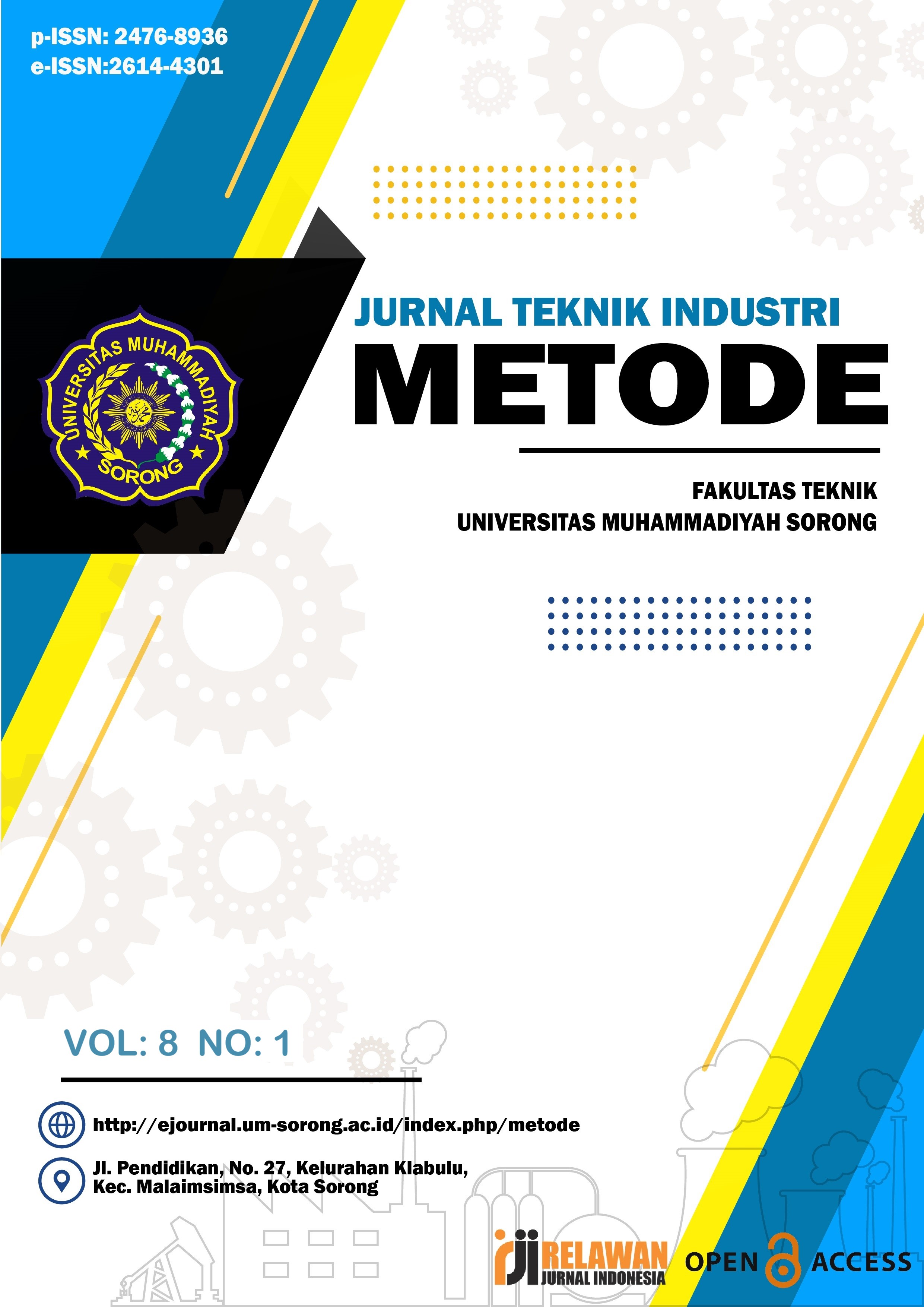Pemanfaatan Masker Limbah COVID-19 Sebagai Upaya Mengurangi Pencemaran Lingkungan
DOI:
https://doi.org/10.33506/mt.v8i1.1698Keywords:
covid-19, limbah masker, lingkungan, QFDAbstract
Masker adalah salah satu jenis alat pelindung diri yang paling penting digunakan sebagai penghalang utama untuk melindungi dari virus yang menyebar melalui tetesan ini. Masker medis merupakan masker yang mudah ditemukan dan sekali pakai yang biasa digunakan oleh tenaga kesehatan yang bertugas. Masker medis berbentuk persegi panjang dan terdiri dari 3 atau 4 lapisan. Setiap lapisan terdiri dari serat lembut hingga sangat lembut. Karakteristik kinerjanya mengikuti serangkaian metode pengujian standar (ASTM F2100, EN 14683 atau setara) yang bertujuan untuk menyesuaikan filtrasi yang baik, ventilasi yang baik, dan ketahanan (opsional) terhadap penetrasi cairan. Â Mengenakan masker sudah menjadi kehidupan sehari-hari bagi banyak orang. Hal ini telah menyebabkan peningkatan yang signifikan dalam permintaan masker wajah sekali pakai di seluruh dunia. Masker wajah sekali pakai adalah salah satu jenis APD yang paling umum digunakan untuk mencegah infeksi virus. Namun, penanganan yang salah dari bahan-bahan ini mengancam lingkungan dengan bentuk-bentuk baru polusi plastik. Mengabaikan keseriusan masalah ini, sejumlah besar mikroplastik dapat dilepaskan ke tempat pembuangan sampah dan lingkungan laut, yang dapat memiliki implikasi serius bagi flora dan fauna. Oleh karena itu, penelitian ini memaparkan dua opsi untuk mendaur ulang limbah masker COVID-19. Selain itu, kami akan menjelaskan perencanaan produk dengan metode QFD.References
Acute, S., & Syndrome, R. Recommendations from the Brazilian Society of Nephrology regarding the use of cloth face coverings , by chronic kidney patients. 2020; 9–11.
Chen, L. H., & Ko, W. C. Fuzzy linear programming models for new product design using QFD with FMEA. Applied Mathematical Modelling. 2009: 33(2), 533–647.
Cordova, M. R. Unprecedented Plastic-Made Personal Protective Equipment (PPE) Debris in River Outlets. River Outlets. 2021.
Dharmaraj, S., Ashokkumar, V., Hariharan, S., Manibharathi, A., Show, P. L., Chong, C. T., & Ngamcharussrivichai, C. The COVID-19 pandemic face mask waste: A blooming threat to the marine environment. Chemosphere. 2021; 272.
Fadare, O. O., & Okoffo, E. D. Covid-19 face masks: A potential source of microplastic fibers in the environment. Science of the Total Environment. 2020; 737.
Fisher, K. A., Barile, J. P., Guerin, R. J., Vanden Esschert, K. L., Jeffers, A., Tian, L. H., … Prue, C. E. Factors Associated with Cloth Face Covering Use Among Adults During the COVID 19 Pandemic. Morbidity and Mortality Weekly Report. 2020; 69(28), 933–937.
Kementerian Kesehatan Republik Indonesia. Pedoman Pengelolaan Limbah Masker di Masyarakat. Jakarta. 2020.
Korkut, E. N. Estimations and analysis of medical waste amounts in the city of Istanbul and proposing a new approach for the estimation of future medical waste amounts. Waste Management. 2018; 81, 168–176.
Lai, C. C., Shih, T. P., Ko, W. C., Tang, H. J., & Hsueh, P. R. Severe acute respiratory syndrome coronavirus 2 (SARS-CoV-2) and coronavirus disease-2019 (COVID-19): The epidemic and the challenges. International Journal of Antimicrobial Agents. 2020; 55(3), 105924.
Masui, K., Sakao, T., Kobayashi, M., & Inaba, A. Applying quality function deployment to environmentally conscious design. International Journal of Quality & Reliability Management. 2003; 20(1), 90–106.
Minoglou, M., Gerassimidou, S., & Komilis, D. Healthcare waste generation worldwide and its dependence on socio-economic and environmental factors. Sustainability. 2017; 9(2).
Nabila, M. Virus Corona Bertahan 3 Hari, Ini Cara Aman Buang Masker Usai. 2021.
Ocampo, L. A., Labrador, J. J. T., Jumao-as, A. M. B., & Rama, A. M. O. Integrated multiphase sustainable product design with a hybrid quality function deployment – multi-attribute decision-making (QFD-MADM) framework. Sustainable Production and Consumption. 2020; 24, 62–78.
Otani, S., & Yamada, S. Application of QFDE on greenhouse gas reduction strategy. International Journal of Quality and Service Sciences. 2011; 3(3), 285–303.
Peng, J., Wu, X., Wang, R., Li, C., Zhang, Q., & Wei, D. Medical waste management practice during the 2019-2020 novel coronavirus pandemic: Experience in a general hospital. American Journal of Infection Control. 2020; 48(8), 918–921.
Prata, J. C., Silva, A. L. P., Duarte, A. C., & Rocha-Santos, T. (2021). Disposable over reusable face masks: Public safety or environmental disaster? Environments – MDPI. 2021; 8(4), 1–10.
Putri, I., S. Studi Literatur: Efektivitas Penggunaan Masker Kain dalam Pencegahan Transmisi Covid-19. Jurnal Kesehatan Manarang. 2020; 6.
Sampol, C. Surgical Masks, Respirators, Barrier Masks: Which Masks Actually Protect against Coronavirus? 2020.
Sangkham, S. Face mask and medical waste disposal during the novel COVID-19 pandemic in Asia. Case Studies in Chemical and Environmental Engineering. 2020; 2.
Susanna Esposito, Nicola Principi, Chi Chi Leung, G. B. M. Universal use of face masks for success against COVID 19: evidence and implications for prevention policies. European Respiratory Journal. 2020; 55.
Szepietowska, M., Krajewski, P., & Szepietowski, J. C. The use of face masks during the COVID-19 pandemic in Poland : a survey study of 2315 young adults.
Torres, F. G., & De-la-Torre, G. E. (2021). Face mask waste generation and management during the COVID-19 pandemic: An overview and the Peruvian case. Science of the Total Environment. 2021; 786.
Vinodh, S., & Rathod, G. Integration of ECQFD and LCA for sustainable product design. Journal of Cleaner Production. 2010; 18(8), 833–842.
WHO. WHO Director-General’s opening remarks at the media briefing on COVID-19. 2020.
WHO. Advice for the public: Coronavirus disease (COVID-19). 2021.
WHO. Anjuran mengenai penggunaan masker dalam konteks COVID-19. 2020; 3.
Younesi, M., & Roghanian, E. A framework for sustainable product design: a hybrid fuzzy approach based on quality function deployment for environment. Journal of Cleaner Production. 2015; 108, 385–394.
Downloads
Published
How to Cite
Issue
Section
License
Copyright (c) 2022 Hanin Fitria, Tita Latifah Ahmad, Syaiful Umam Rizaq

This work is licensed under a Creative Commons Attribution-ShareAlike 4.0 International License.









